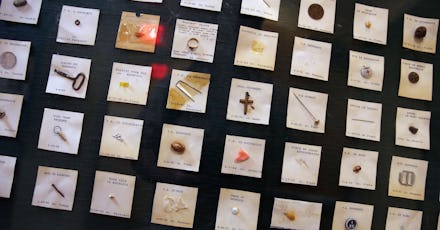Hospital Artfully Displays All the Weird Random Things Kids Have Swallowed

In the early 90s, my brother stuffed a raisin so far up his nose that our father had to remove it with a pair of tweezers.
Indeed, children have been stuffing obscure things in their noses and swallowing inanimate objects since the beginning of time. The Boston Children's Hospital has managed to document the items in an artful but somewhat macabre way, the Associated Press reported.
The most vintage items in the display case, which hangs in the hospital's ear, nose and throat department, date back to 1918. While the visual is definitely attention-grabbing and, if anything, amusing in a morbid kind of manner, it's meant to serve as a warning for parents.
"It is definitely something that catches the eyes of parents and makes them think twice about what their kids are exposed to," Dr. Anne Hseu, a head and neck surgeon at the hospital, told the AP. Hseu herself has extracted carpet tacks, holiday ornaments and toys from patients.
Some of the more noteworthy items preserved behind the glass include a teensy little doll hand, a screw hook (sharp!), a ring, wearable pins and a pearl. Dr. Sarah Denny, an emergency department pediatrician at Nationwide Children's Hospital, told the AP that magnets, latex balloons and detergent pods are some of the more common objects kids stick in their orifices.
Detergent pods in particular are a risk to children because of their candy-like colors. The Regional Poison Control Center at the hospital Children's of Alabama, for example, has received more than 700 phone calls regarding kids ingesting this product since 2012, the Alabama Medical Group reported.
While the Boston hospital's visual display is certainly entertaining, it's important to note that they show just a sample of the thousands of items that children ingest each year. Beyond the dangers of choking, these objects can lead to brain damage, infection, chronic cough or worse, the AP reported. Denny told the AP it's important for parents to ensure their kids' toys are age-appropriate, and that smaller objects should be kept far out of reach.